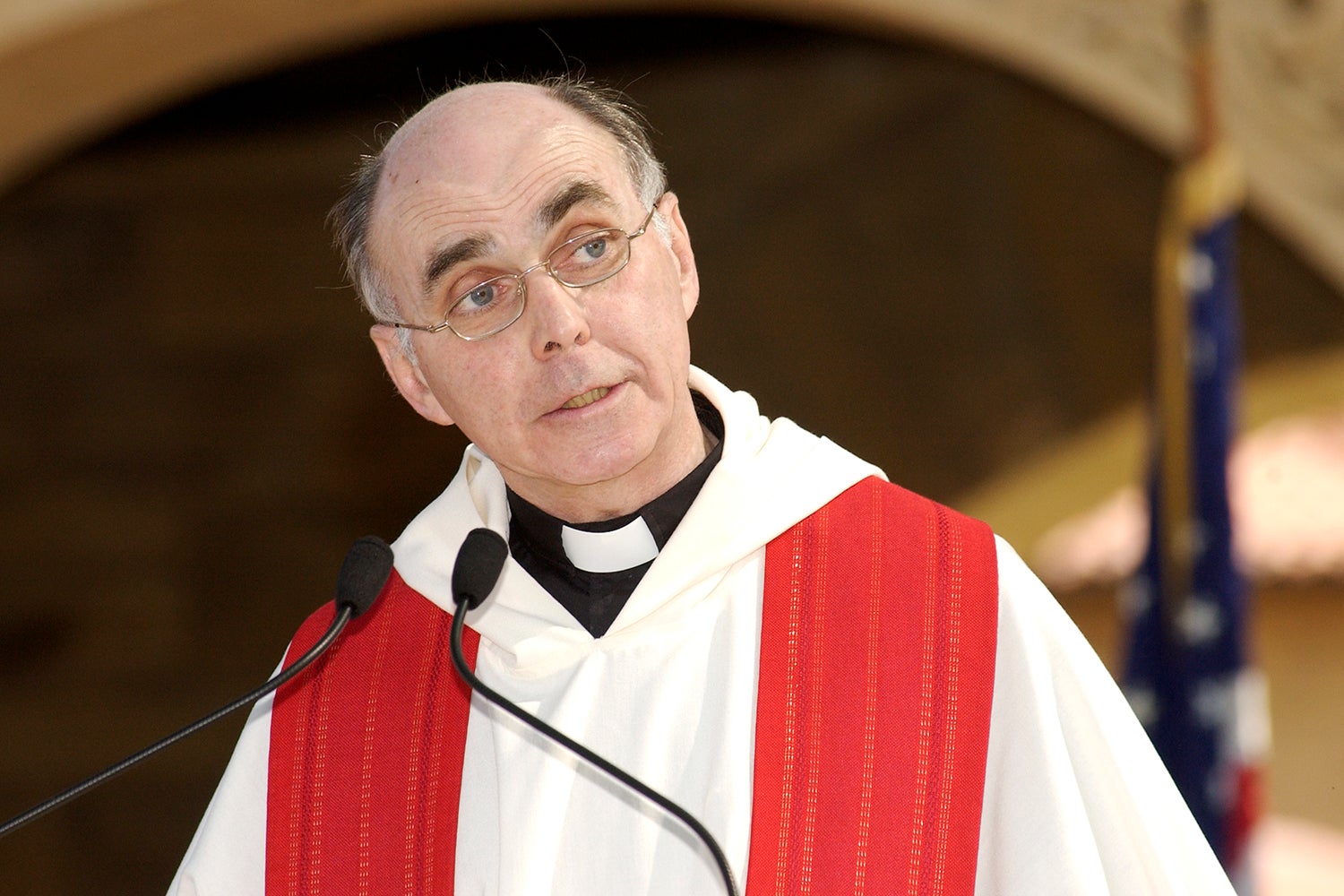Peace requires ‘bravery, risk,’ the Rev. J. Bryan Hehir says at Baccalaureate
Head of Catholic Charities USA addresses an estimated 3,500; celebration in Quad features prayer, music of many faiths.
“Lead me from untruth to truth; lead me from darkness to light; lead me from death to immortality.”

J. Bryan Hehir, president of Catholic Charities USA, presented the Baccalaureate address Saturday. (Image credit: L.A. Cicero)
Sumir Meghani, a graduating senior in economics, read these lines of Hindu scripture Saturday morning in the Quad at the beginning of the 2003 Baccalaureate Celebration.
The event, which also included readings, prayers and music from the Jewish, Buddhist, Muslim, Christian and Shinto traditions, took place on an unusually mild mid-June weekend before a sea of mortarboards, sunglasses, straw hats and sun dresses.
The annual celebration acknowledges the contributions of spirituality and religion to the education of graduating students. Organizers estimated the audience comprised about 3,500 graduates, family members and university employees.
“In recent years, the Baccalaureate has been a multifaith experience celebrating the magnificent diversity that this university has come to embody,” said the Rev. Scotty McLennan, dean for religious life. “This should feel like a feast of and for the world.”
McLennan called for a moment of silence in memory of several members of the Class of 2003 who died before earning their bachelor’s degrees: Artyom Valeryevich Batykyan, Brianna Marie Germer, Lena Rufus and Patty Jeanne K. Semura.
Afterward, the Rev. J. Bryan Hehir, president of Catholic Charities USA, presented the baccalaureate address, which he called “Building the Peace: A Gift and a Task.”
“I have a large topic, but I’ll put you at rest: I have a very short time,” he quipped.
Peace is a “divine gift and human work,” Hehir said. He emphasized the importance of embracing both propositions. “The large and sometimes elusive gift of peace is something that we strive for continuously and seldom achieve completely, and it is possible to yield to frustration and despair when peace is overcome by violence and injustice,” he said. “We need to have a sense that we are not alone in this path – that the gift is given to us to be achieved and that the work we do is done in collaboration with a larger, broader, wider force in the universe that we call, under different names, the god who is creator and sustains the world.”
Peace is difficult to achieve, Hehir said. It is not a “soft-headed idea.” “Everyone recognizes that war is hard: It requires courage, bravery, risk and sacrifice,” he added. “But peace is hard, also; it takes the same qualities of courage, bravery, risk and sacrifice. … War has a beginning and usually a definitive end. There are victories, treaties, settlements. Peace is an ongoing effort; we achieve it, then we have to solidify it.”
Graduating senior Valarie Kaur Brar, a third-generation Sikh American, also spoke during the celebration. After the terrorist attacks of Sept. 11, 2001, Brar embarked on a film project to document hate crimes and prejudice directed at Sikh Americans and other communities.
Born and raised in Clovis, Brar said she led a happy and safe childhood but was disturbed by encounters with friends “who demanded that [she] convert to Christianity in order to be saved.” She said that when she first came to Stanford, the cross on top of Memorial Church frightened her.
Now, speaking of the friends she has made at Stanford, she said, “I’ve seen the divine in each of you. And you have strengthened me. Strengthened me so much that when I see that cross, I’m not afraid anymore. I look above and I see a man, with open arms, entering the world, embracing the world.”
